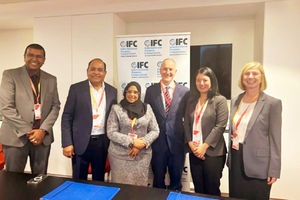Empowering domestic workers

When Angela Benedicto completed secondary education in 2007, she undoubtedly knew that was the end of her school journey. And perhaps the end of her dream for a better future.
An orphan, Angela had no one to pay for her high school education. As the first born, she instead had the responsibility to take care of her six siblings. It wasn’t easy.
Armed with only a Form Four leaving certificate, Angela decided to travel over 45 kilometres from Ukerewe District to Mwanza City to look for a job.
She had no relatives in the city but a friend of her late mother was kind enough to host her while she looked for a job. The young girl who had never been to Mwanza before was confident that her secondary school education would enable her get a job. She was wrong.
In May 2008 after months of endless search, Angela settled for a house help job. Although she was not comfortable with the Sh20,000 salary offer, she thought it was better than nothing. She needed money to support her siblings back home.
“My siblings were young and depended on me to put food on the table. Our parents died when we were young and so it was my responsibility to take care of them,” explains the 30 year old woman.
Unfortunately things did not work out as she had expected as the employer sometimes failed to pay her salary. At times the employer would pay her half the amount and sometimes nothing at all. If she accidentally broke a glass or any other utensils, her salary would be deducted.
After working for a year as a domestic worker, Angela decided to try her luck elsewhere. She, once again, tried to look for job but the few employers who bothered to consider her wanted someone with work experience. She ended up taking another house help job and it was the same story again.
“It was the same thing. Late payment and salary deductions for broken dishes. At times my employer would borrow money from my little salary that she would never repay,” explains Angela.
Life was difficult but Angela had come to the city for a purpose. Her ordeals as a house help made her wish she could do something to change that. She started to, seriously, consider the idea after she attended awareness raising sessions at Kivulini, a civil society organisation, which works to improve women’s rights.
“Kivulini fights for the rights of women and girls in the community. The organisation was not far from where I was staying so I would visit from time to time.”
In 2012, Angela set out to start her own organisation, WoteSawa, which literally means, all are equal. The organisation’s aim is to fight for the rights of house helps.
“It was a dream come true. I wanted to create a place where girls going through the same ordeal as I did could come for solace and learn about their rights and responsibilities,” says Angela.
WoteSawa was born in a small rented room. Here, she taught girls about their rights as human beings, their responsibilities as domestic workers, and how to build good relationship with employers.
Two years down the line, WoteSawa became a household name in Mwanza city.
Angela reaches domestic workers through canvassing. In collaboration with street leaders she visits one house after another talking to girls about their workplace rights. She also invites them to visit her organisation whenever they have time.
“In the beginning many employers were reluctant to allow me to talk to their domestic workers. So I was obliged to consult ward and street leaders to get easy access to domestic workers,” Angela says.
Through WoteSawa organisation, many girls have found a purpose in life. Some went ahead and found better jobs.
WoteSawa, which presently has 17 staff, covers Mwanza and Kigoma. It also plans to open branches in Shinyanga and Mara.
The organisaiton has helped more than a hundred young girls with training in tailoring after which they are given sewing machines. The organisation is funded by international donors, Foundation for Civil Society and other well-wishers.
The organisation also empowers domestic workers to demand job contracts. Amina, a house help who has undergone training at WoteSawa, says she earned life and work skills which have enabled her to love and enjoy her work.
“I have a job contract. It is an agreement between my employer and I on what my duties, rights and responsibilities are. This includes salary and the mode of payment. My employer has never breached the contract and we have been living in peace,” says Amina.
Angela says contracts enable house helps to enjoy their rights and demand what belongs to them. Contracts also bind them to be responsible in case of any damage.
Hilda Kato, a senior state attorney in the office of the attorney general in Dar es Salaam, says a contract is an entitlement for all workers. She says some people lie that their house helps are relatives to avoid legal responsibility.
“It is not easy for all employers to pay house helps as per the law, which puts the minimum amount to Sh270,000 per month,” explains Kato.
Stella Mutta, an activist says giving a house help a contract makes them work more efficiently bearing in mind that they will get what rightfully belongs to them and on time.
Angela’s work has not only received local recognition but international as well. In 2015, she was among two Tanzanians who were awarded the Queen’s Young Leaders Award. This is an annual award given in recognition of leadership skills by young persons between the ages of 18 and 29.
“The award raised our organisation’s profile as many people got to know us and what we do. This opened new opportunities for our organisation,” says Angela.
To continue with her school journey which came to a halt after she completed Form Four, Angela, is currently pursuing a Bachelor’s degree in Law at the Open University.
Who would have dreamt that the poor orphan would one day travel all the way to England to meet and shake hands with Queen Elizabeth? Neither did Angel have the idea she would start an organisation that would be known locally and beyond the borders.




